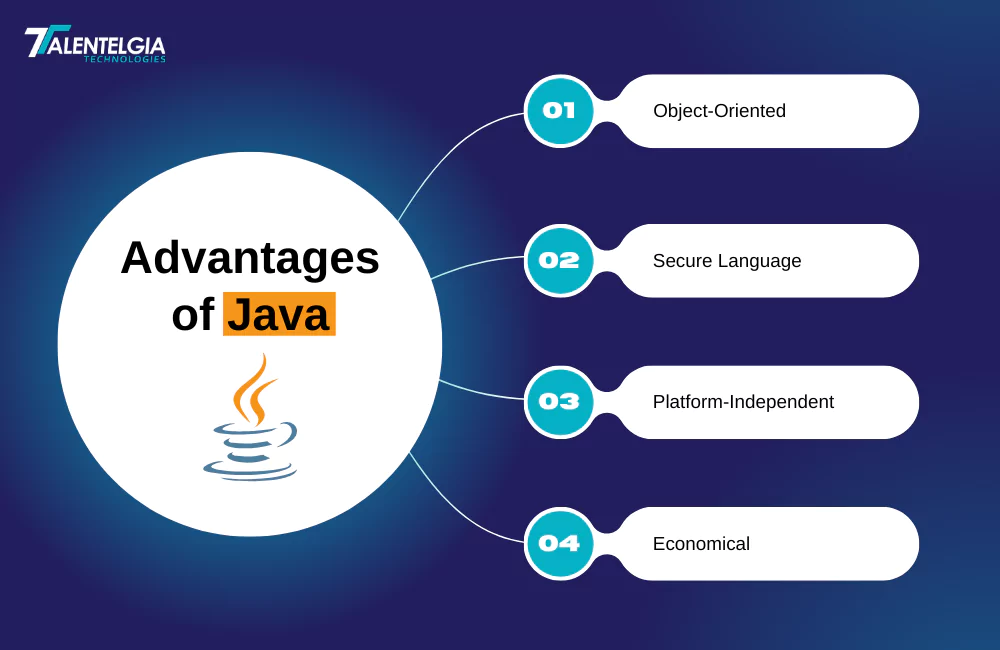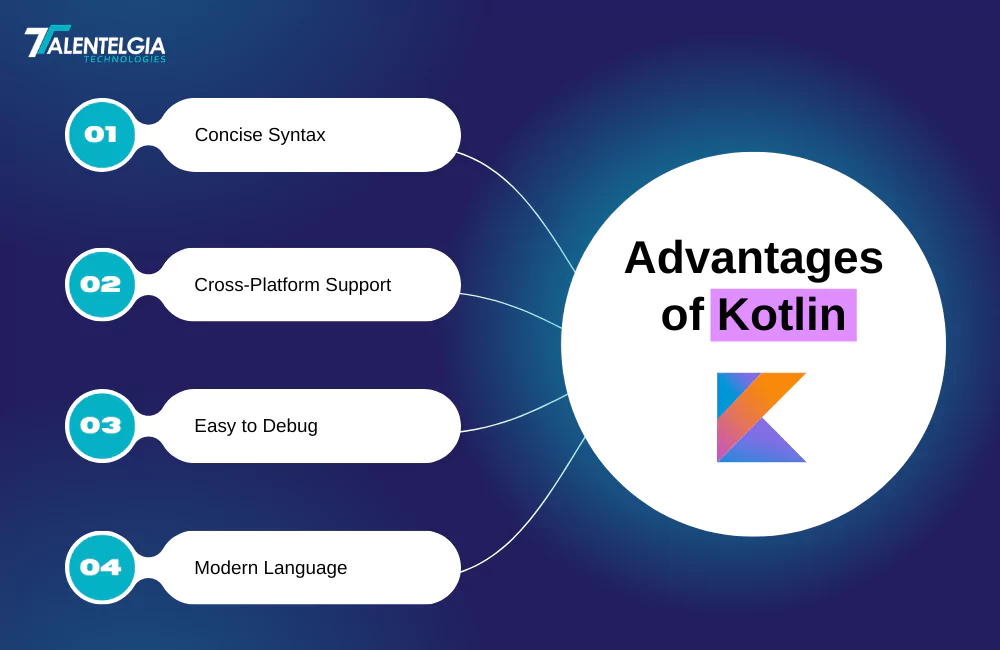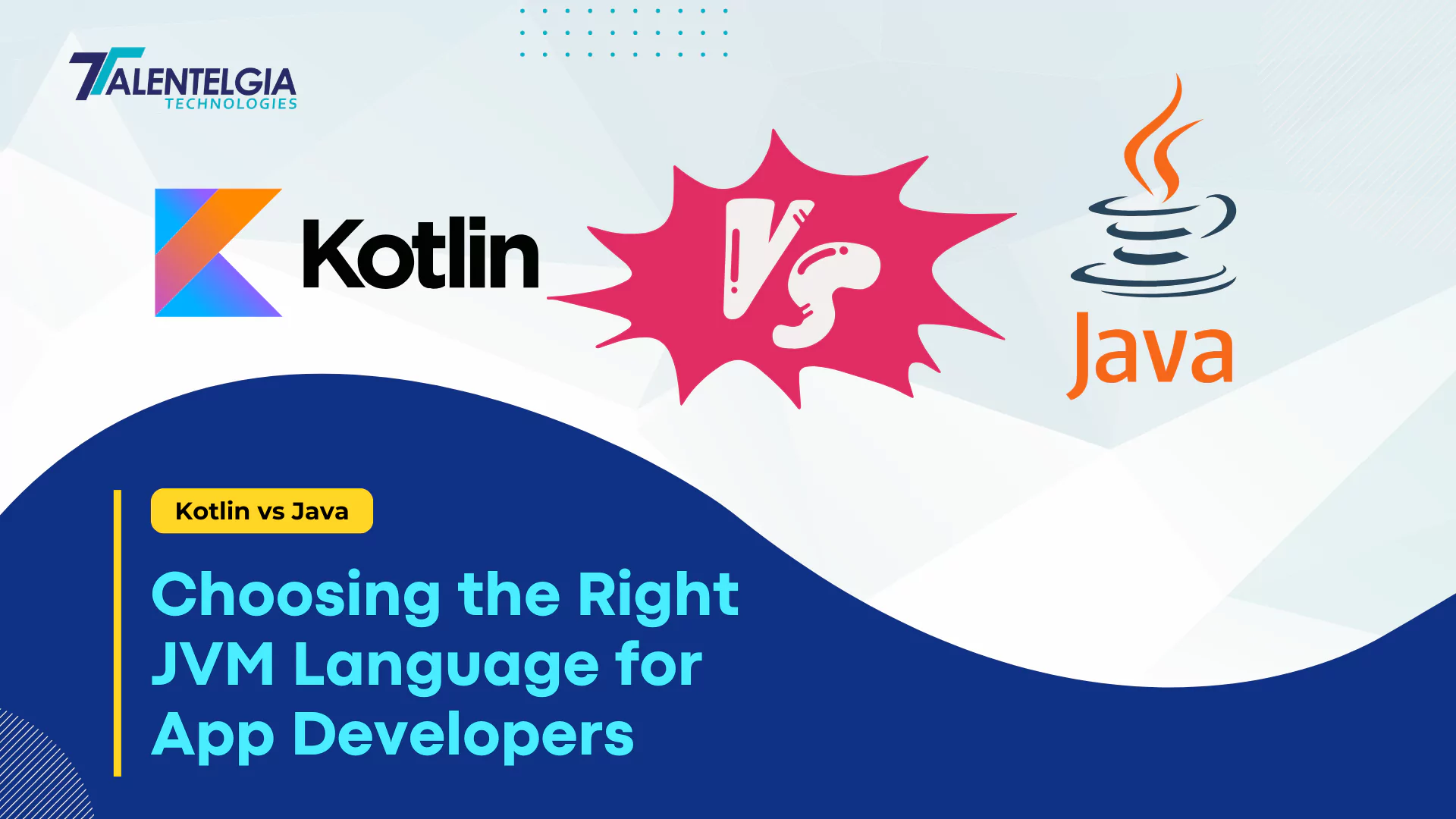Ever wondered whether Kotlin or Java is the better choice for making apps? Think for a while about how much we use apps every day. They enable us to do a lot, from making shopping lists, sending messages, and having fun, to having groceries being delivered to our door. Apps are an inseparable part of our world and therefore the people who create them are extremely significant.
Now, Sundar Pichai, the boss of Google, once said something interesting. He said –
“In the mobile-first world, every business is a software business.”
It is kind of logical, isn’t it? Thus, with every company developing software, especially apps, the language in which such apps are written becomes important.
Among the main decisions are Kotlin and Java. They are like two different types of tools used to develop software. Kotlin is the new hot kid on the block, with some hipster stuff that makes code writing simpler and more efficient. JAVA, however, is an old language, and it is famous for being solid and reliable Some developers are into Kotlin, while others use Java only. It’s a hot issue and many people have been arguing about which is the best option.
In this blog called “Kotlin vs Java: We’ll cover the “JVM Language for Developers – the Right Choice” in the next episode. We’ll see what every language does, what’s super-cool about them, and what makes them different from each other.
Let’s begin and we will determine which of the two languages is the best fit for you and your projects in the mobile app-making world.
What is Kotlin Programming Language?
Kotlin is a language of programming that is increasingly chosen by developers. It is kind of like Java, but the purpose was to complement some aspects that some developers find problematic with Java. Java code can be quite verbose and it can have problems like “null pointer exceptions” which can lead to crashes or bugs.
The development of Kotlin programming language started in July 2011. This interoperability, in turn, allows Java developers to move to Kotlin. It is a language well-known for its clean, readable and easy-to-maintain code style, so it is used for Android app development.
What is Java programming language?
Learning Java programming language, which is widely acknowledged as one of the most popular programming languages in the world, is one of the topics that we make most of our thanks to its intriguing nature. Sun Microsystems had the platform blended in the mid-1990s and has become a de facto platform used by corporations and large organizations since then. Java is highly valued for its reliability and stability; the programs written in Java are usually either without crashes or with only minor crashes.
Java’s success is due to the availability of libraries and tools consisting of all the required resources to build different applications. Besides, it has been tested and proven to be working and has been there for a long time therefore it is relied upon in the building of applications that handle heavy traffic and sensitive data such as online banking and e-commerce platforms. Although Java is no longer the favorite of many developers who choose a secure and reliable combination in their software, it remains the option of choice for most developers.
Summary–
Choosing between them is crucial for developers. Kotlin, starting in 2011, aims to fix Java’s verbosity and null issues, and is popular for Android app development with clean, maintainable code. Java, a staple since the mid-1990s, triumphs in large-scale systems with its robust libraries and proven track record, ideal for high-traffic, sensitive data handling applications.
Benefits of Java

Reliability and Error Reduction
Early Error Detection: The design of Java centres on early error detection, which is much like a spell checker for code. This provides a solution to the post-deployment problems, improves the reliability of the Java-based software.
Portability
Write Once, Run Anywhere: Java follows the philosophy of “write once, run anywhere”, letting developers write it once and run it on any other platform without any changes. It increases the accessibility, thus making the Java apps to be running on different devices.
Talent Pool and Community Support
Abundance of Skilled Professionals: Java’s longstanding presence has cultivated a vast community of skilled professionals. This abundance of expertise simplifies recruitment for Java-based projects, ensuring a readily available talent pool.
Documentation and Community
Extensive Resources: Java benefits from extensive documentation and a robust community. This provides developers with a wealth of resources and support, making problem-solving a collaborative and efficient process.
Stability and Predictability
Scheduled Updates: Java follows predictable update schedules, aiding businesses in planning for future developments. Its stability reduces unexpected disruptions, offering a reliable platform for long-term projects.
Benefits of Kotlin

Concise Syntax and Readability
Streamlined Coding Experience: Kotlin is designed with a concise syntax that enhances code manageability, allowing developers to achieve more with less code. This streamlining minimizes unnecessary details, making code more readable and maintainable.
Functional Programming
Functional programming is supported by both Java and Kotlin, however Kotlin was focused on this idea as a core feature that brings benefits like first-class functions, lambdas, and immutability. Java, however, has lambdas and the Stream API to support functional programming which it wasn’t really design for at the beginning.
Extension Functions
Enhanced Modularity: Kotlin revolutionizes code extension with extension functions, allowing the addition of features to existing classes without altering their source code. This promotes modularity and expressive coding, contrasting with Java’s more cumbersome approaches to class enhancement.
Smart Casts
Intelligent Type Conversions: Kotlin introduces smart casts, an intelligent casting system that automates type conversions after object type checks. This enhances code conciseness, readability, and safety, outperforming Java’s explicit casting and redundant type checking.
Coroutines
Efficient Asynchronous Programming: Kotlin introduces coroutines, a game-changer for writing scalable and efficient asynchronous code. It simplifies complex tasks like network I/O or UI updates, offering a more straightforward approach compared to Java’s multithreading with reduced boilerplate.
Summary –
Kotlin’s benefits encompass concise syntax, robust null safety, innate support for functional programming, extension functions for enhanced modularity, smart casts for intelligent type conversions, efficient coroutines, optimized compilation speed, a friendly learning curve, Google’s support in Android development, and a rapidly growing and innovative community.
Pros and Cons of Kotlin and Java
| Criteria | Kotlin | Java |
|---|---|---|
| Readability | Pros: Syntax with less boilerplate. | Cons: Code is complex, potentially slowing down development. |
| Interoperability | Pros: Fully interoperable with Java. | Pros: Widespread use in enterprises. |
| Learning Curve | Pros: Easier for Java developers due to similarities. | Cons: May have a steeper learning curve for new developers. |
| Conciseness | Pros: Reduces the amount of code, which may lead to fewer bugs. | Cons: Verbosity might increase the likelihood of bugs. |
| Tool Support | Pros: Excellent support for IntelliJ & Android Studio. | Pros: Ecosystem with more tools. |
| Null Safety | Pros: Built-in language features prevent many common errors related to nullability. | Cons: Requires explicit null checks. |
| Performance | Pros: Similar performance to Java, with some overhead due to additional features. | Pros: High performance due to mature JVM optimizations. |
| Use Cases | Pros: Especially popular for Android Development, but also well-suited for server-side applications. | Pros: Wide range of use cases, including enterprise applications. |
| Community Support | Pros: Growing community and support, especially from Google for Android. | Pros: Established and extensive community support. |
Kotlin vs Java: A Detailed Comparison
1. Syntax and Conciseness
Kotlin was built with the idea of reducing the complexity of programming. Its compact syntax permits you to write less code to achieve more. Pull it like a strong punch in a small box. By minimizing unnecessary details, Kotlin makes code easier to manage and understand, letting developers concentrate on the unique functionality of their applications rather than the verbosity of their code.
Java Pros:
– Familiar syntax for many programmers.
– Clarity and explicitness may benefit beginners.
Java Cons:
– More verbose, leading to longer code.
– Increased risk of error due to boilerplate.
Kotlin Pros:
– Conciseness leads to less code to write and maintain.
– Language features, like data classes, simplify coding.
Kotlin Cons:
– Conciseness might confuse developers new to Kotlin.
– Potentially overlook complexities in code behavior.
2. Null Safety
In Java, dealing with null can lead to the dreaded NullPointerException, often requiring developers to write extensive null-checks. Kotlin introduces a robust system for null safety that distinguishes between nullable and non-nullable types, reducing the chances of runtime crashes and ensuring coder peace of mind. This layer of protection built into the type system allows for more reliable and maintainable code.
Java Pros:
– Encourages careful consideration of null cases.
– Existing tools to help manage null safely.
Java Cons:
– Verbose null handling.
– Common null pointer exceptions.
Kotlin Pros:
– Built-in null safety helps prevent common bugs.
– Less boilerplate code due to automatic null checks.
Kotlin Cons:
– Interacting with Java code can complicate null safety.
– Learning curve for handling Kotlin’s type system.
3. Functional Programming
Java and Kotlin support functional programming, but Kotlin was designed with it in mind, and consequently, it has features like first-class functions, lambdas, and immutability. However, Java is functional-programming friendly, even though the lambdas and the Stream API are there to support functional programming from its inception.
Java Pros:
– Supports functional programming with lambdas and streams.
– Modernized language with newer functional features.
Java Cons:
– Less intuitive functional programming support.
– Retrofitting functional features into an OOP language.
Kotlin Pros:
– Built-in functional programming features and paradigms.
– Intuitive and concise use of functional concepts.
Kotlin Cons:
– Requires mindset shift for imperative programmers.
– Potentially steep learning curve.
4. Extension Functions
Kotlin revolutionizes how you extend functionality through extension functions, allowing you to tack on new features to existing classes without altering their source code. Java, however, typically requires subclassing or other workarounds to enhance or modify class behavior, which can be more cumbersome and less direct than Kotlin’s extensions.
Java Pros:
– Clear extension via inheritance or design patterns.
– Familiar OOP extension model for developers.
Java Cons:
– No native support for extension functions.
– Potential for more boilerplate and less flexibility.
Kotlin Pros:
– Enhance classes without altering their code.
– Encourages modularity and expressive coding.
Kotlin Cons:
– Can lead to codebase confusion if overused.
– May hinder maintainability if not well-managed.
5. Smart Casts
Kotlin’s intelligent casting system, known as smart casts, can automatically handle type conversions once an object type is checked, boosting both safety and readability. Java, traditionally leaning towards explicitness, requires developers to cast objects manually, making the code more verbose and less streamlined compared to the Kotlin approach.
Java Pros:
– Explicit typing aligns with strong type system principles.
– Straightforward casting is easy to grasp.
Java Cons:
– Code can become bloated with casting operations.
– Requires redundant type checking.
Kotlin Pros:
– Eliminates redundant casts, improving code conciseness.
– Enhances safety by preventing incorrect casting.
Kotlin Cons:
– Learning how smart casts operate.
– Restricted by variable mutability and smart cast limitations.
6. Coroutines
Kotlin introduces coroutines, a game-changer for writing asynchronous code that’s scalable and more efficient than Java’s multithreading. Java can handle concurrency but often with more boilerplate and steeper learning curve. Meanwhile, Kotlin’s coroutines streamline complex tasks like network I/O or UI updates, making developers’ lives easier without locking up the user’s device.
Java Pros:
– Diverse and well-tested concurrency libraries.
– Established patterns for handling concurrency.
Java Cons:
– Complex and verbose compared to Kotlin’s coroutines.
– Steeper learning curve for effective thread management.
Kotlin Pros:
– Simplifies asynchronous programming significantly.
– Lightweight compared to Java threads; integrates into language.
Kotlin Cons:
– Different from traditional Java threading, has its learning curve.
– Debugging can become more complex.
7. Compilation Speed
Compilation speed matters in development, and generally, Java has the upper hand by quickly translating code into a running app. While Kotlin’s compiler is a bit slower, it has seen optimizations reducing this gap. Rapid compilation is crucial for large projects and quick iterations, and each language aims to provide the most efficient route from code to completion.
Java Pros:
– Faster compile times, beneficial for large projects.
– Mature compiler with extensive optimizations.
Java Cons:
– Kotlin’s increasingly faster compilation might narrow Java’s lead.
Kotlin Pros:
– Compiler optimizations are continually shortening compile times.
– Incremental compilation offers potential speed-ups.
Kotlin Cons:
– Generally slower compilation, especially noticeable in larger projects.
8. Learning Curve
When comparing the learning curve of Java and Kotlin, Java’s longevity and widespread use have created a vast resource pool, while Kotlin’s modern features offer a friendlier approach for beginners. While Java’s versatility is indisputable, Kotlin’s streamlined syntax may offer a quicker grasp for developers dipping their toes in the programming world.
Java Pros:
– Abundance of learning resources and community wisdom.
– Long-standing use in education and industry.
Java Cons:
– Complexity and wide range of features can overwhelm newbies.
Kotlin Pros:
– Readable syntax and modern constructs can ease learning.
– More accessible for beginners due to less boilerplate code.
Kotlin Cons:
– Requires understanding Kotlin-specific features.
– Smaller community compared to Java.
9. Android Development
Android development has a new star with Kotlin, dubbed by Google as the go-to language for app creators. This support elevates Kotlin, offering modern language perks that streamline Android development. Yet, Java’s presence as the original Android language means a robust foundation of legacy code and resources that new apps can still leverage.
Java Pros:
– Long-standing foundation of Android development with vast ecosystem.
– Extensive libraries and tools for traditional Android app creation.
Java Cons:
– No longer the primary language recommended by Google.
Kotlin Pros:
– Google support and modern language benefits for Android.
– Idiomatic features and support for newer Android functionality.
Kotlin Cons:
– Still developing ecosystem compared to Java’s established one.
– Interoperability issues with older Java Android codebases.
10. Community and Support
Java’s community is like a vast, well-rooted tree offering plentiful support and collective knowledge. Meanwhile, Kotlin’s community is thriving rapidly, providing fresh perspectives and innovative solutions that go hand in hand with modern software development practices. Each language benefits from strong support, whether it’s the tried-and-tested resources of Java or the expanding universe of Kotlin’s growing community.
Java Pros:
– Massive, experienced community with a rich knowledge base.
– Wide range of tutorials, forums, and professional support.
Java Cons:
– Keeping up with language updates can challenge some.
Kotlin Pros:
– Enthusiastic, fast-growing community with modern solutions.
– Active support from JetBrains and endorsement by Google.
Kotlin Cons:
– Smaller but budding community with developing resources.
– Emerging ecosystem that is yet to reach Java’s comprehensiveness.
Summary–
Kotlin offers concise syntax, null safety, and native support for functional programming, while Java provides familiarity and a mature ecosystem. Despite Java’s lead in compilation speed, Kotlin’s growing community and modern features make it a strong contender.
What is the Best JVM Language For App Developers?
Choosing the best JVM language for app development boils down to your project’s needs, the team’s familiarity with the language, and specific features like modern syntax, null safety, and functional programming support.
Both Kotlin and Java have their merits, with Kotlin providing modern features and expressive code, and Java offering stability and a comprehensive ecosystem.
Conclusion
The decision between Kotlin and Java for JVM-based app development is not one-size-fits-all. Kotlin provides an agile and concise approach suited for modern applications, particularly for Kotlin app development services, while Java remains a powerhouse with unmatched familiarity and ecosystem support.
Recognizing the needs of your project and the capabilities of each language will lead to the best choice for your development journey.


 Healthcare App Development Services
Healthcare App Development Services
 Real Estate Web Development Services
Real Estate Web Development Services
 E-Commerce App Development Services
E-Commerce App Development Services E-Commerce Web Development Services
E-Commerce Web Development Services Blockchain E-commerce Development Company
Blockchain E-commerce Development Company
 Fintech App Development Services
Fintech App Development Services Fintech Web Development
Fintech Web Development Blockchain Fintech Development Company
Blockchain Fintech Development Company
 E-Learning App Development Services
E-Learning App Development Services
 Restaurant App Development Company
Restaurant App Development Company
 Mobile Game Development Company
Mobile Game Development Company
 Travel App Development Company
Travel App Development Company
 Automotive Web Design
Automotive Web Design
 AI Traffic Management System
AI Traffic Management System
 AI Inventory Management Software
AI Inventory Management Software
 AI Software Development
AI Software Development  AI Development Company
AI Development Company  AI App Development Services
AI App Development Services  ChatGPT integration services
ChatGPT integration services  AI Integration Services
AI Integration Services  Generative AI Development Services
Generative AI Development Services  Natural Language Processing Company
Natural Language Processing Company Machine Learning Development
Machine Learning Development  Machine learning consulting services
Machine learning consulting services  Blockchain Development
Blockchain Development  Blockchain Software Development
Blockchain Software Development  Smart Contract Development Company
Smart Contract Development Company  NFT Marketplace Development Services
NFT Marketplace Development Services  Asset Tokenization Company
Asset Tokenization Company DeFi Wallet Development Company
DeFi Wallet Development Company Mobile App Development
Mobile App Development  IOS App Development
IOS App Development  Android App Development
Android App Development  Cross-Platform App Development
Cross-Platform App Development  Augmented Reality (AR) App Development
Augmented Reality (AR) App Development  Virtual Reality (VR) App Development
Virtual Reality (VR) App Development  Web App Development
Web App Development  SaaS App Development
SaaS App Development Flutter
Flutter  React Native
React Native  Swift (IOS)
Swift (IOS)  Kotlin (Android)
Kotlin (Android)  Mean Stack Development
Mean Stack Development  AngularJS Development
AngularJS Development  MongoDB Development
MongoDB Development  Nodejs Development
Nodejs Development  Database Development
Database Development Ruby on Rails Development
Ruby on Rails Development Expressjs Development
Expressjs Development  Full Stack Development
Full Stack Development  Web Development Services
Web Development Services  Laravel Development
Laravel Development  LAMP Development
LAMP Development  Custom PHP Development
Custom PHP Development  .Net Development
.Net Development  User Experience Design Services
User Experience Design Services  User Interface Design Services
User Interface Design Services  Automated Testing
Automated Testing  Manual Testing
Manual Testing  Digital Marketing Services
Digital Marketing Services 
 Ride-Sharing And Taxi Services
Ride-Sharing And Taxi Services Food Delivery Services
Food Delivery Services Grocery Delivery Services
Grocery Delivery Services Transportation And Logistics
Transportation And Logistics Car Wash App
Car Wash App Home Services App
Home Services App ERP Development Services
ERP Development Services CMS Development Services
CMS Development Services LMS Development
LMS Development CRM Development
CRM Development DevOps Development Services
DevOps Development Services AI Business Solutions
AI Business Solutions AI Cloud Solutions
AI Cloud Solutions AI Chatbot Development
AI Chatbot Development API Development
API Development Blockchain Product Development
Blockchain Product Development Cryptocurrency Wallet Development
Cryptocurrency Wallet Development About Talentelgia
About Talentelgia  Our Team
Our Team  Our Culture
Our Culture 
 Healthcare App Development Services
Healthcare App Development Services Real Estate Web Development Services
Real Estate Web Development Services E-Commerce App Development Services
E-Commerce App Development Services E-Commerce Web Development Services
E-Commerce Web Development Services Blockchain E-commerce
Development Company
Blockchain E-commerce
Development Company Fintech App Development Services
Fintech App Development Services Finance Web Development
Finance Web Development Blockchain Fintech
Development Company
Blockchain Fintech
Development Company E-Learning App Development Services
E-Learning App Development Services Restaurant App Development Company
Restaurant App Development Company Mobile Game Development Company
Mobile Game Development Company Travel App Development Company
Travel App Development Company Automotive Web Design
Automotive Web Design AI Traffic Management System
AI Traffic Management System AI Inventory Management Software
AI Inventory Management Software AI Software Development
AI Software Development AI Development Company
AI Development Company ChatGPT integration services
ChatGPT integration services AI Integration Services
AI Integration Services Machine Learning Development
Machine Learning Development Machine learning consulting services
Machine learning consulting services Blockchain Development
Blockchain Development Blockchain Software Development
Blockchain Software Development Smart contract development company
Smart contract development company NFT marketplace development services
NFT marketplace development services IOS App Development
IOS App Development Android App Development
Android App Development Cross-Platform App Development
Cross-Platform App Development Augmented Reality (AR) App
Development
Augmented Reality (AR) App
Development Virtual Reality (VR) App Development
Virtual Reality (VR) App Development Web App Development
Web App Development Flutter
Flutter React
Native
React
Native Swift
(IOS)
Swift
(IOS) Kotlin (Android)
Kotlin (Android) MEAN Stack Development
MEAN Stack Development AngularJS Development
AngularJS Development MongoDB Development
MongoDB Development Nodejs Development
Nodejs Development Database development services
Database development services Ruby on Rails Development services
Ruby on Rails Development services Expressjs Development
Expressjs Development Full Stack Development
Full Stack Development Web Development Services
Web Development Services Laravel Development
Laravel Development LAMP
Development
LAMP
Development Custom PHP Development
Custom PHP Development User Experience Design Services
User Experience Design Services User Interface Design Services
User Interface Design Services Automated Testing
Automated Testing Manual
Testing
Manual
Testing About Talentelgia
About Talentelgia Our Team
Our Team Our Culture
Our Culture

















 Write us on:
Write us on:  Business queries:
Business queries:  HR:
HR: 





